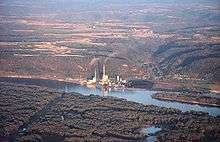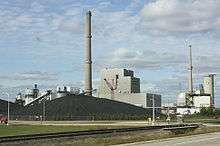La Crosse Boiling Water Reactor
| La Crosse Boiling Water Reactor | |
|---|---|
 Looking east, across the Mississippi River toward Wisconsin. LACBWR (left stack) and Genoa Station #3 coal power plant (right stack). | |
 Location of La Crosse Boiling Water Reactor within Wisconsin | |
| Country | United States |
| Location | Genoa, Wisconsin |
| Coordinates | 43°33′36″N 91°13′53″W / 43.560062°N 91.231485°WCoordinates: 43°33′36″N 91°13′53″W / 43.560062°N 91.231485°W |
| Status | Decommissioned |
| Construction began | March 1, 1967[1] |
| Commission date | November 7, 1969[1] |
| Decommission date | April 30, 1987[1] |
| Operator(s) | Dairyland Power Cooperative |
| Nuclear power station | |
| Reactor type | BWR[1] |
| Power generation | |
| Units decommissioned | 50 MWe[1] |
| Nameplate capacity | 50 MWe[1] |
La Crosse Boiling Water Reactor (LACBWR) is a retired Boiling Water Reactor (BWR) nuclear power plant located near La Crosse, Wisconsin in the small village of Genoa, in Vernon County, Wisconsin, approximately 17 miles south of La Crosse along the Mississippi River. The site is owned and was operated by the Dairyland Power Cooperative (DPC).
LACBWR was built in 1967 as part of a federal project to demonstrate the viability of peacetime nuclear power. It was funded in part by the Atomic Energy Commission (AEC) in cooperation with Dairyland Power Cooperative. LACBWR had a 50 MW electrical output from a forced-circulation, direct-cycle boiling water reactor as its heat source.[2] In 1973 the reactor and fuel were transferred in full to Dairyland Power.

In April 1987, LACBWR was shut down because the small size of the plant made it no longer economically viable. It was placed in SAFSTOR August 7, 1991. Limited and gradual dismantlement is currently underway, with plans to store spent fuel onsite in dry casks until federal storage is available. The reactor pressure vessel was removed in May 2007 and shipped to Chem-Nuclear's Barnwell, South Carolina Low-Level Radioactive Waste (LLRW) disposal facility. The shipment weighed approximately 310 tons and required a specially designed rail car.
References
- 1 2 3 4 5 6 "Lacrosse Reactor Details". IAEA. 2013-04-13. Retrieved 2013-04-14.
- ↑ "La Crosse Boiling Water Reactor". Nuclear Regulatory Commission. Retrieved 2013-04-14.